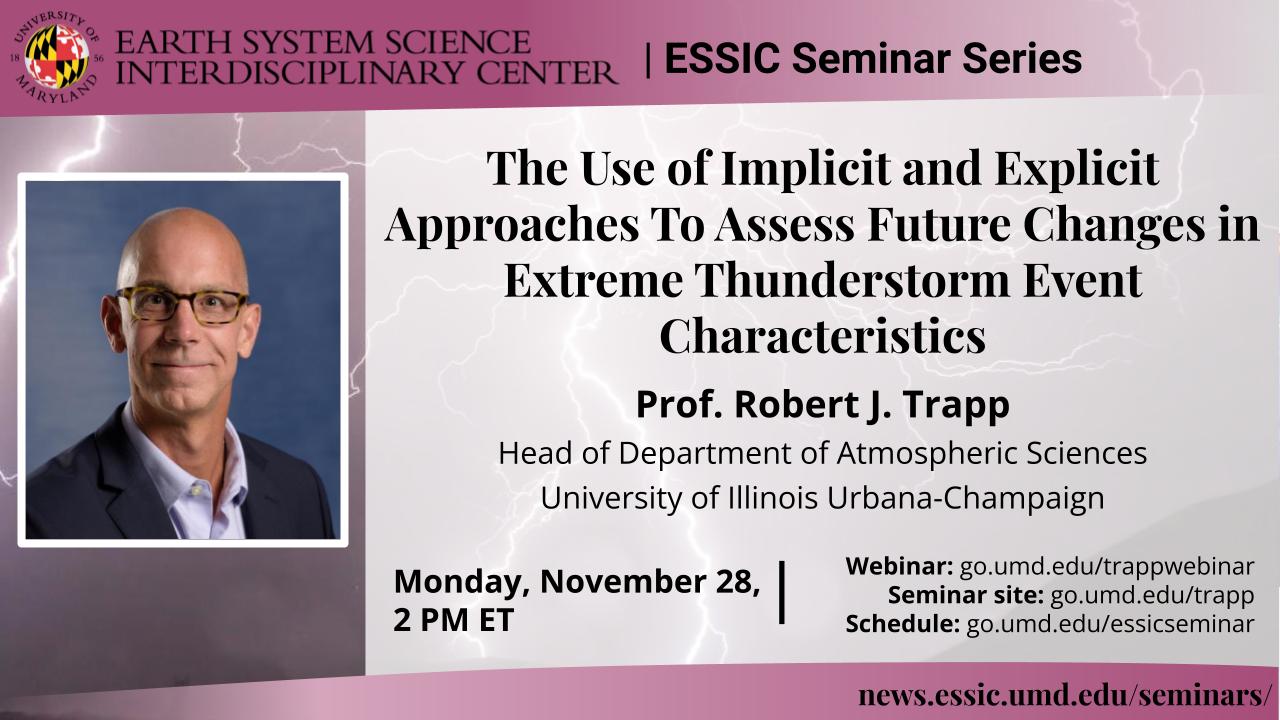
The Use of Implicit and Explicit Approaches To Assess Future Changes in Extreme Thunderstorm Event Characteristics
Prof. Robert J. Trapp
Head of Department of Atmospheric Sciences
University of Illinois Urbana-Champaign
Monday November 28, 2022, 2 PM ET
Abstract:
The number of inflation-adjusted, billion-dollar disasters due to extreme thunderstorms in the United States has increased from an average of two events per year in 1991, to more than eight per year in 2021. This alarming trend has raised important questions about how the occurrence of these storms, and their attendant tornadoes, hail, and/or thunderstorm winds, relate to anthropogenic climate change.
Answers to such questions are facilitated by the fact that thunderstorms and their hazards are controlled strongly by their environmental distributions of temperature, humidity, and wind. Accordingly, environmental-based proxies of the frequency and intensity of thunderstorm hazards have been developed and successfully used for risk assessment under current and well as projected future climates. A description of key results will be provided, as will a discussion of the limitations, which include the inability of proxies to account for the initiation of deep convective storms and thus their realization of the hazards. This limitation is removed through the use of convection-allowing dynamical downscaling. A recent application of this explicit and hence more computationally intensive approach to reveal aspects of the changing risk of hailstorms will be presented.
Neither of these approaches, however, offers a clear path for process-level understanding of the extreme events. For this we employ an event-based pseudo-global-warming (PGW) modeling approach. This approach will be illustrated using recent extreme thunderstorm events, including the 10 August 2020 derecho, which to date is the costliest thunderstorm event in U.S. history, and the 10 December 2021 tornado outbreak, which is the deadliest December tornado event on record in the U.S.
Biosketch:
Robert J. Trapp is a Professor and Head of the Department of Atmospheric Sciences at the University of Illinois Urbana-Champaign. He conducts research on severe convective storms, their attendant hazards, and their connection with climate change and variability. He is also the author of the textbook “Mesoscale-Convective Processes in the Atmosphere,” published by Cambridge University Press.
Webinar:
Event site: https://go.umd.edu/trapp
Zoom Webinar: https://go.umd.edu/trappwebinar
Zoom Meeting ID: 960 8137 9484
Zoom password: essic
US Toll: +13017158592
Global call-in numbers: https://umd.zoom.us/u/aMElEpvNu
For IT assistance:
Cazzy Medley: cazzy@umd.edu
Resources:
Seminar schedule & archive: https://go.umd.edu/essicseminar
Seminar Google calendar: https://go.umd.edu/essicseminarcalendar
Seminar recordings on Youtube: https://www.youtube.com/user/ESSICUMD

